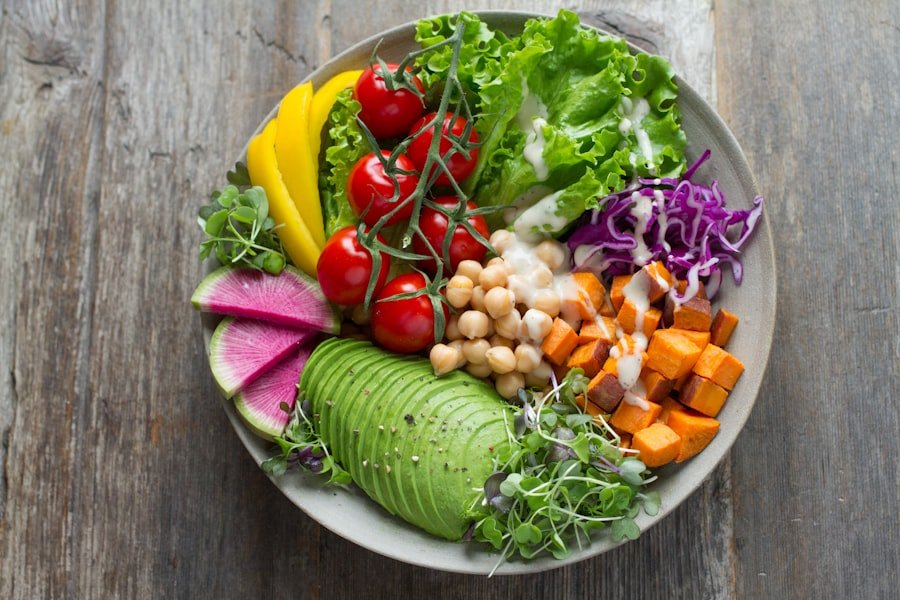
The Power of Plants: A Guide to Optimal Vegetarian Nutrition
In recent years, there has been a significant rise in the popularity of plant-based diets. Many people are choosing to adopt vegetarian or vegan lifestyles for various reasons, including ethical concerns, environmental sustainability, and health benefits. A plant-based diet is centered around consuming foods derived from plants, such as fruits, vegetables, whole grains, legumes, nuts, and seeds, while minimizing or eliminating the consumption of animal products.
One of the key benefits of a plant-based diet is its potential to improve overall health and well-being. Research has shown that plant-based diets are associated with a reduced risk of chronic diseases such as heart disease, type 2 diabetes, obesity, and certain types of cancer. This is due to the high nutrient content found in plant-based foods, which provide essential vitamins, minerals, antioxidants, and fiber that support optimal health.
However, it is important to note that proper nutrition is crucial when following a vegetarian or vegan diet. While plant-based diets can be highly nutritious, they require careful planning to ensure that all essential nutrients are obtained. It is essential to understand the nutritional value of plants and how to obtain a balanced intake of macronutrients and micronutrients to support overall health.
Key Takeaways
- A plant-based diet can provide numerous health benefits, including reducing the risk of chronic diseases and promoting weight loss.
- Plants are rich in essential nutrients such as fiber, vitamins, and minerals, making them a valuable addition to any diet.
- Vegetarians can obtain sufficient protein by consuming a variety of plant-based sources such as legumes, nuts, and seeds.
- Micronutrients such as iron, omega-3 fatty acids, and calcium are important for overall health and can be obtained through plant-based sources.
- A balanced vegetarian diet should include a variety of whole foods, including fruits, vegetables, whole grains, and plant-based protein sources.
The Nutritional Value of Plants: A Comprehensive Overview
Plants are packed with a wide range of nutrients that are essential for our bodies to function properly. They are rich in vitamins, minerals, antioxidants, and fiber that contribute to overall health and well-being.
Vitamins: Plants are excellent sources of vitamins such as vitamin C, vitamin A (in the form of beta-carotene), vitamin K, and various B vitamins. These vitamins play crucial roles in supporting immune function, promoting healthy skin and eyesight, aiding in blood clotting and bone health, and supporting energy production.
Minerals: Plants are also abundant in minerals such as potassium, magnesium, calcium, iron, and zinc. These minerals are essential for various bodily functions, including maintaining healthy blood pressure, supporting muscle and nerve function, promoting bone health, and aiding in the production of red blood cells.
Antioxidants: Plants are rich in antioxidants, which help protect our cells from damage caused by harmful molecules called free radicals. Antioxidants such as vitamin C, vitamin E, and various phytochemicals found in plants have been linked to a reduced risk of chronic diseases such as heart disease and certain types of cancer.
Fiber: Plants are an excellent source of dietary fiber, which is important for maintaining a healthy digestive system. Fiber helps regulate bowel movements, promotes satiety, and can help lower cholesterol levels and control blood sugar levels.
The Role of Macronutrients in Vegetarian Nutrition
Macronutrients are the nutrients that our bodies need in large amounts to provide energy and support various bodily functions. They include carbohydrates, protein, and fat. It is important to obtain sufficient amounts of these macronutrients when following a plant-based diet to ensure optimal nutrition.
Carbohydrates: Carbohydrates are the body’s primary source of energy. They are found in abundance in plant-based foods such as fruits, vegetables, whole grains, legumes, and starchy vegetables like potatoes. It is important to choose complex carbohydrates that are high in fiber and low in refined sugars to support stable blood sugar levels and provide sustained energy throughout the day.
Protein: Protein is essential for building and repairing tissues, supporting immune function, and producing enzymes and hormones. Contrary to popular belief, it is possible to obtain sufficient protein on a plant-based diet. Plant-based sources of protein include legumes (such as beans, lentils, and chickpeas), tofu and tempeh, seitan, quinoa, nuts and seeds (such as almonds, chia seeds, and hemp seeds), and certain vegetables like broccoli and spinach.
Fat: Fat is an important macronutrient that provides energy, supports brain function, and helps absorb fat-soluble vitamins. Plant-based sources of healthy fats include avocados, nuts and seeds, olives and olive oil, coconut and coconut oil, and plant-based oils such as flaxseed oil and hempseed oil. It is important to choose unsaturated fats over saturated fats to support heart health.
Protein Sources in a Plant-Based Diet: How to Get Enough
| Protein Source | Amount of Protein per Serving | Other Nutrients |
|---|---|---|
| Lentils | 18g | Fiber, iron, folate |
| Chickpeas | 14.5g | Fiber, iron, folate |
| Quinoa | 8g | Fiber, iron, magnesium |
| Tofu | 10g | Calcium, iron |
| Tempeh | 15g | Calcium, iron |
| Nuts (almonds, peanuts, cashews) | 6-8g | Healthy fats, fiber, vitamin E |
| Seeds (chia, hemp, pumpkin) | 3-6g | Healthy fats, fiber, iron |
One of the most common misconceptions about vegetarian and vegan diets is that they do not provide enough protein. However, with proper planning, it is entirely possible to obtain sufficient protein on a plant-based diet.
Legumes are an excellent source of plant-based protein. They include beans (such as black beans, kidney beans, and chickpeas), lentils, peas, and soy products like tofu and tempeh. These foods are not only rich in protein but also provide fiber, vitamins, and minerals.
Quinoa is a complete protein source, meaning it contains all nine essential amino acids that our bodies cannot produce on their own. It is also high in fiber and other nutrients such as iron and magnesium.
Nuts and seeds are another great source of protein in a plant-based diet. Almonds, walnuts, cashews, chia seeds, hemp seeds, and flaxseeds are all rich in protein and healthy fats. They can be added to meals or used as toppings for salads or smoothies.
Certain vegetables also contain significant amounts of protein. Broccoli, spinach, Brussels sprouts, and peas are all examples of vegetables that are relatively high in protein compared to other vegetables.
To ensure adequate protein intake on a plant-based diet, it is important to include a variety of these protein-rich foods in meals throughout the day. Combining different plant-based protein sources can also help ensure a complete amino acid profile.
The Importance of Micronutrients in Vegetarian Nutrition
While macronutrients provide the body with energy, micronutrients are essential for supporting various bodily functions and maintaining overall health. Micronutrients include vitamins and minerals, which are found in abundance in plant-based foods.
Vitamins: Plant-based diets can provide all the essential vitamins needed for optimal health. Fruits and vegetables are excellent sources of vitamins such as vitamin C, vitamin A, vitamin K, and various B vitamins. Whole grains, legumes, nuts, and seeds also contribute to the intake of vitamins such as thiamine, riboflavin, niacin, and folate.
Minerals: Plant-based diets can also provide all the essential minerals needed for optimal health. Fruits and vegetables are rich in minerals such as potassium, magnesium, and calcium. Legumes, nuts, and seeds contribute to the intake of minerals such as iron, zinc, and selenium.
Essential Vitamins and Minerals for Optimal Health

While all vitamins and minerals are important for overall health, there are certain nutrients that vegetarians and vegans should pay special attention to.
Vitamin B12: Vitamin B12 is primarily found in animal products, so it can be challenging for vegetarians and vegans to obtain sufficient amounts. However, fortified plant-based foods such as breakfast cereals, plant-based milks, and nutritional yeast can provide a source of vitamin B12. It may also be necessary to consider taking a vitamin B12 supplement to ensure adequate intake.
Iron: Iron is important for transporting oxygen throughout the body and preventing iron-deficiency anemia. Plant-based sources of iron include legumes (such as lentils and chickpeas), tofu and tempeh, quinoa, fortified cereals, nuts and seeds (such as pumpkin seeds and sesame seeds), and dark leafy greens (such as spinach and kale). It is important to consume iron-rich foods along with vitamin C-rich foods to enhance iron absorption.
Calcium: Calcium is essential for building and maintaining strong bones and teeth. Plant-based sources of calcium include dark leafy greens (such as kale and collard greens), fortified plant-based milks, tofu made with calcium sulfate, almonds, sesame seeds, and fortified orange juice. It is important to consume calcium-rich foods along with vitamin D to enhance calcium absorption.
Iodine: Iodine is important for thyroid function and the production of thyroid hormones. Plant-based sources of iodine include seaweed (such as nori and kelp), iodized salt, and fortified plant-based milks. However, it is important to be mindful of iodine intake, as excessive amounts can be harmful. Consulting with a healthcare professional or registered dietitian can help ensure adequate iodine intake.
Plant-Based Iron Sources: How to Avoid Deficiencies
Iron is an essential mineral that plays a crucial role in transporting oxygen throughout the body. Iron deficiency is one of the most common nutrient deficiencies worldwide, and it can lead to fatigue, weakness, and impaired immune function.
Plant-based sources of iron include legumes (such as lentils, chickpeas, and black beans), tofu and tempeh, quinoa, fortified cereals, nuts and seeds (such as pumpkin seeds and sesame seeds), and dark leafy greens (such as spinach and kale). It is important to consume these iron-rich foods along with vitamin C-rich foods to enhance iron absorption.
Vitamin C enhances the absorption of non-heme iron (the type of iron found in plant-based foods). Including foods high in vitamin C such as citrus fruits, strawberries, bell peppers, broccoli, and tomatoes in meals can help maximize iron absorption.
It is also important to avoid consuming iron inhibitors such as tea, coffee, and calcium-rich foods at the same time as iron-rich foods, as they can interfere with iron absorption. Consuming iron-rich foods with foods that are high in vitamin C and low in calcium can help optimize iron absorption.
Omega-3 Fatty Acids: Getting Enough on a Vegetarian Diet
Omega-3 fatty acids are a type of polyunsaturated fat that is essential for brain health, heart health, and reducing inflammation in the body. While omega-3 fatty acids are commonly associated with fish and seafood, there are plant-based sources available for vegetarians and vegans.
Flaxseeds and chia seeds are excellent sources of alpha-linolenic acid (ALA), which is a type of omega-3 fatty acid. These seeds can be ground and added to smoothies, oatmeal, or used as an egg substitute in baking.
Walnuts are another plant-based source of omega-3 fatty acids. They can be eaten as a snack or added to salads, oatmeal, or baked goods.
Hemp seeds are also rich in omega-3 fatty acids. They can be sprinkled on top of salads, yogurt, or blended into smoothies.
It is important to note that the conversion of ALA to the active forms of omega-3 fatty acids (EPA and DHA) is limited in the body. Therefore, it may be beneficial for vegetarians and vegans to consider including an algae-based omega-3 supplement to ensure adequate intake of EPA and DHA.
Plant-Based Calcium Sources: Building Strong Bones
Calcium is essential for building and maintaining strong bones and teeth. While dairy products are commonly associated with calcium, there are plenty of plant-based sources available for vegetarians and vegans.
Dark leafy greens such as kale, collard greens, and bok choy are excellent sources of calcium. These greens can be sautéed, added to salads, or used in smoothies.
Fortified plant-based milks such as almond milk, soy milk, and oat milk are also good sources of calcium. It is important to choose fortified options that provide at least 30% of the daily value for calcium.
Tofu made with calcium sulfate is another plant-based source of calcium. It can be used in stir-fries, curries, or grilled as a meat substitute.
Almonds and sesame seeds are also rich in calcium. They can be eaten as a snack or added to salads, stir-fries, or baked goods.
It is important to note that calcium absorption can be influenced by other factors such as vitamin D levels and overall nutrient intake. Consuming calcium-rich foods along with vitamin D-rich foods (such as fortified plant-based milks or exposure to sunlight) can help enhance calcium absorption.
Putting It All Together: Tips for a Balanced Vegetarian Diet
Creating a balanced vegetarian or vegan diet that meets all nutritional needs requires careful planning and consideration. Here are some tips to help you put it all together:
1. Include a variety of plant-based foods in your diet: Aim to consume a wide range of fruits, vegetables, whole grains, legumes, nuts, and seeds to ensure you are getting a diverse array of nutrients.
2. Plan your meals ahead of time: Planning your meals in advance can help ensure that you are including all the necessary nutrients in your diet. Consider using meal planning apps or websites to help you create balanced meal plans.
3. Experiment with new plant-based foods and recipes: Don’t be afraid to try new foods and recipes. There are countless plant-based options available that can add variety and excitement to your meals.
4. Consider supplementation if necessary: While it is possible to obtain all essential nutrients from a well-planned plant-based diet, certain nutrients may require supplementation. Consult with a healthcare professional or registered dietitian to determine if you need any additional supplements.
5. Stay informed and educated: Keep up to date with the latest research and information on plant-based nutrition. Attend workshops, read books, and follow reputable sources to ensure you are making informed decisions about your diet.
In conclusion, a plant-based diet can provide numerous health benefits when properly planned and executed. By understanding the nutritional value of plants and how to obtain a balanced intake of macronutrients and micronutrients, individuals can thrive on a vegetarian or vegan lifestyle. With careful planning, it is entirely possible to meet all nutritional needs while enjoying a wide variety of delicious and nutritious plant-based foods.
FAQs
What is a vegetarian diet?
A vegetarian diet is a diet that excludes meat, poultry, fish, and other animal-derived products. Vegetarians consume plant-based foods such as fruits, vegetables, grains, legumes, nuts, and seeds.
What are the health benefits of a vegetarian diet?
A vegetarian diet has been associated with numerous health benefits, including lower risk of heart disease, high blood pressure, type 2 diabetes, and certain types of cancer. It can also help with weight management and improve overall gut health.
What are some common nutrient deficiencies in a vegetarian diet?
Vegetarians may be at risk for deficiencies in certain nutrients, such as protein, iron, calcium, vitamin D, vitamin B12, and omega-3 fatty acids. However, with proper planning and a varied diet, these nutrients can be obtained from plant-based sources or supplements.
What are some good sources of protein for vegetarians?
Vegetarians can obtain protein from a variety of plant-based sources, such as beans, lentils, tofu, tempeh, nuts, seeds, and whole grains. Combining different sources of plant-based protein can also help ensure adequate intake.
How can vegetarians ensure they are getting enough iron?
Vegetarians can obtain iron from plant-based sources such as beans, lentils, tofu, spinach, and fortified cereals. Consuming vitamin C-rich foods, such as citrus fruits or bell peppers, can also help enhance iron absorption.
What are some good sources of calcium for vegetarians?
Vegetarians can obtain calcium from plant-based sources such as leafy greens, tofu, fortified plant milks, and fortified cereals. Consuming calcium-rich foods alongside vitamin D-rich foods or supplements can also help enhance calcium absorption.
What are some good sources of vitamin B12 for vegetarians?
Vitamin B12 is primarily found in animal-derived products, but vegetarians can obtain it from fortified plant milks, fortified cereals, and nutritional yeast. Vitamin B12 supplements may also be necessary for some vegetarians.


















